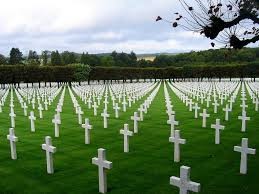
PHOTO: War Graves in Normandy
Germany ended World War II having lost 8.23% of its 1939 population killed. Roughly two million German females of all ages were raped by Russian soldiers as and after the war in Europe ended.
Germany was first occupied by America Britain France and Russia, and then divided into two countries, the Federal Republic of Germany (West Germany) and the German Democratic Republic (East Germany).
France and Belgium had both lost more than 1% of their 1939 population. They had been occupied by the Germans. Luxembourg and The Netherlands had been occupied by the Germans.
Italy was fought over by German and Allied troops.
All of the people in these countries were desperate to avoid another war.
The pre-war League of Nations had failed to prevent war.
Although the United Nations had been set up there were doubts about how successful the United Nations would be in preventing another European war. Something stronger was needed.
The purpose of the European Coal and Steel Community (1951) (ECSC) was to integrate the economies of the six participating countries so tightly that neither Germany nor France could start a war. The idea was to make war impractical.
With a common market in coal and steel there was no need for trade disputes and tariff wars.
Britain could have joined when ECSC was formed in 1951 but Britain did not wish to be subject to a supranational authority.
The European Economic Community was founded in 1957. Originally running alongside Euratom (1957) and the ECSC they eventually merged. The EEC was to extend the existing common market to goods beyond coal and steel, and became known as “the Common Market”.
In 1973 the six founding countries were joined by Britain, Ireland, and Denmark. At the time Britain had long running economic and political problems which joining the Common Market would supposedly help. “Pooling sovereignty” meant that Britain was subject to European Union Directives and Regulations.
In 1974 the famous Lord Denning commented on the new treaty then constituting the European Union,
“But when we come to matters with a European element, the treaty is like an incoming tide. It flows into the estuaries and up the rivers. It cannot be held back. Parliament has decreed that the treaty is henceforward to be part of our law. It is equal in force to any statute. The governing provision is s 2(1) of the European Communities Act 1972. The statute…is expressed in forthright terms which are absolute and all-embracing. Any rights or obligations created by the treaty are to be given legal effect in England without more ado. Any remedies or procedures provided by the treaty are to be made available here without being open to question. In future, in transactions which cross the frontiers, we must no longer speak or think of English law as something on its own. We must speak and think of Community law, …”
The movement of the EU into British daily life was unstoppable.
Anyone who has had to deal with tariffs and customs inspections and visas will appreciate the advantages to commerce and industry of not having to deal with these problems. The Four Pillars of the European Union pronounced in 1993 were for the Single Market Agreement.
Freedom of Movement of Goods
Freedom of Movement of Services
Freedom of Movement of Labour
Freedom of Movement of Capital
Imagine if the 13 American States had not formed a single currency. People would now be watching the daily movements of the Nebraska dollar versus the Florida dollar versus the California dollar. The profits made by the currency dealers would be a loss for everyone else.
The Euro was founded for the same reasons. The European Central Bank is supported by the strength of the German economy.
The European Union has its problems, but in terms of preventing a war in Western Europe it has been successful. The expansion of the European Union across Europe is because a prosperous Western Europe is a market that everyone wishes to join.

Recent Comments